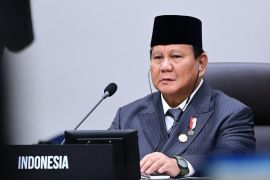New Zealand Minister of Finance and Deputy Prime Minister Grant Robertson hosted the Informal Finance Ministerial Meeting with the APEC Business Advisory Council (ABAC) in a bid to intensify exchanges of views and experiences on best practices for helping businesses survive the health and economic crisis, according to a release issued by the APEC Secretariat and received here on Friday.
In his opening remarks, Minister Robertson, concurrently the 2021 Chair of the APEC Finance Ministers’ Process, noted that the informal dialog enabled a deeper understanding of the concerns that the private sector has within the APEC region. These engagements inform the policy discussions that APEC Finance Ministers will have at their meeting later in October.
"The Finance Ministers’ Process this year is focusing on the macroeconomic responses to COVID and a longer-term look at how fiscal policy and budget frameworks may evolve as a result of the pandemic," Minister Robertson remarked.
"Partnerships between governments, businesses, and civil societies are critical to the region’s response to COVID-19 and will continue to play an important role in the longer-term recovery," he affirmed.
Ongoing challenges, such as social inequality arising from the rapid evolution of technology, as well as accelerating climate change and growing inequality in income and wealth distribution remain a focus for APEC economies, especially given the uneven impact of COVID-19.
Discussions have encompassed the criticality of adopting pertinent measures to handle those issues and the range of policy tools being applied to support communities.
Those measures comprise assistance to preserve jobs and livelihoods, fiscal and monetary stimulus to support businesses, open borders for trade, especially for essential medicines, equipment and services, and resistance to protectionist restrictions.
At the dialogue, ministers and business leaders shared their views on the most crucial and impactful policies that economies should focus on to aid businesses in the recovery.
Minister Robertson recapped that the fiscal and monetary policy must continue to play a role in combatting the impacts of the pandemic, but it is also clear that stimulus alone is not sufficient.
"The pandemic has enforced a need for complementary macroeconomic and structural policy," he stressed.
Business leaders highlighted the importance of trade and open markets in spreading the availability of vaccines, essential health supplies and associated goods and services, and keeping global supply chains moving.
"It is clear for us that addressing the continuing pandemic must be the top priority for APEC economies — overcoming the health crisis and using widespread vaccination and testing for safe and seamless reopening of borders as a pre-requisite for economic recovery," according to Rachel Taulelei, the 2021 chair of the APEC Business Advisory Council.
"Trade is an enabler of a return to sustainable economic growth in the region," Taulelei stated.
APEC ministers and business leaders also deliberated on the significance of the region’s recovery being sustainable and inclusive, and how economies and businesses can work together to achieve this goal.
"Sustainability and inclusion are ongoing challenges, which need a stepped-up response in a region that needs to learn to live with COVID," Taulelei highlighted.
She stressed that actions to address climate change and other environmental risks are necessary for a healthy planet, and eventually, for healthy economies and societies.
"Some people have already paid too high a price during the pandemic, including women, youth, indigenous people, those living in rural areas, and those without the skills required for an increasingly digital economy. Their well-being needs to be a priority as we move forward," she affirmed.
APEC Secretariat Executive Director, Rebecca Sta Maria, acknowledged member economies’ commitment to increasing cooperation in the past year and reminded ministers that the unprecedented crisis needs holistic, bold, and practical responses.
"In addition to international cooperation and coordination, cross-functional and inter-agency linkages are as crucial as member economies pursue long-term, sustainable solutions to economic resiliency and recovery," Sta Maria stated. Related news: APEC releases compilation of economic response, recovery initiatives
Related news: APEC lays basis for sustainable fiscal management to drive recovery
EDITED BY INE
Reporter: Yuni Arisandy Sinaga
Editor: Suharto
Copyright © ANTARA 2021











